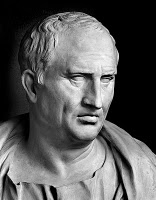Relevant Quote from Cicero
“True law is right reason in agreement with nature [This must be unpacked]; it is of universal application, unchanging and everlasting; it summons to duty by its commands, and averts from
 wrongdoing by its prohibitions…It is a sin to try to alter this law, nor is it allowable to repeal any part of it, and it is impossible to abolish it entirely. We cannot be freed from its obligations by senate or people, and we need not look outside ourselves for an expounder or interpreter of it. And there will not be different laws at Rome and at Athens, or different laws now and in the future, but one eternal and unchangeable law will be valid for all nations and at all times, and there will be one master and ruler, that is God, over us all, for he is the author of this law, its promulgator and its enforcing judge. Whoever is disobedient is fleeing from himself and denying his human nature, and by reason of this very fact he will suffer the worst punishment.”
wrongdoing by its prohibitions…It is a sin to try to alter this law, nor is it allowable to repeal any part of it, and it is impossible to abolish it entirely. We cannot be freed from its obligations by senate or people, and we need not look outside ourselves for an expounder or interpreter of it. And there will not be different laws at Rome and at Athens, or different laws now and in the future, but one eternal and unchangeable law will be valid for all nations and at all times, and there will be one master and ruler, that is God, over us all, for he is the author of this law, its promulgator and its enforcing judge. Whoever is disobedient is fleeing from himself and denying his human nature, and by reason of this very fact he will suffer the worst punishment.”
 wrongdoing by its prohibitions…It is a sin to try to alter this law, nor is it allowable to repeal any part of it, and it is impossible to abolish it entirely. We cannot be freed from its obligations by senate or people, and we need not look outside ourselves for an expounder or interpreter of it. And there will not be different laws at Rome and at Athens, or different laws now and in the future, but one eternal and unchangeable law will be valid for all nations and at all times, and there will be one master and ruler, that is God, over us all, for he is the author of this law, its promulgator and its enforcing judge. Whoever is disobedient is fleeing from himself and denying his human nature, and by reason of this very fact he will suffer the worst punishment.”
wrongdoing by its prohibitions…It is a sin to try to alter this law, nor is it allowable to repeal any part of it, and it is impossible to abolish it entirely. We cannot be freed from its obligations by senate or people, and we need not look outside ourselves for an expounder or interpreter of it. And there will not be different laws at Rome and at Athens, or different laws now and in the future, but one eternal and unchangeable law will be valid for all nations and at all times, and there will be one master and ruler, that is God, over us all, for he is the author of this law, its promulgator and its enforcing judge. Whoever is disobedient is fleeing from himself and denying his human nature, and by reason of this very fact he will suffer the worst punishment.”
– Marcus Tullius Cicero, 44 B.C De Re Publica Book III.
Just a few notes:
- Cicero recognizes the need for both commands and prohibitions. Its not enough to just tell people what not to do, nor enough to just say what they should do. Both must be used. For example, if the Church’s only answer to the secular world claiming that it is ignorant for not accepting “gay marriage” is: “Marriage between a man and a woman is a good thing, do that,” then the Church will cause confusion for the sake of avoiding controversy.
- Second, Cicero notes that neither the people nor the senate can abolish the obligations of natural. Try all the “redefining” of marriage you want, but it cannot work on something which you have no power over. Marriage and biology and the good of society itself antedates government.
- “True law is right reason in agreement with nature”. This is exactly the Church’s point in the HHS mandate struggle. As Leo XIII said: “An unjust law is no law.” This is where the difference between freedom and license comes in. Freedom is the ability to choose the good, where license is the ability to choose arbitrarily whatever you may wish.
- Not only this, but right reason itself is in agreement with nature. Though Cicero had not fully developed this idea at the time to the extent Aristotle or Aquinas had, this is simply the idea that what is good is that which brings fulfillment and perfection to our nature. It does not mean “what is good is what is natural”–as this is the famous naturalistic fallacy pointed out by G.E. Moore. What is good is that which brings our nature some sort of perfection or completion. What is good for the nature of a plant? Water and sun. What is not good for its nature? Paint. As good as the store “Whole Foods” is, the place is not good because it is natural. It is good because its contents may lend towards health faster than McDonalds. For more on the naturalistic fallacy and the natural law, feel free to read my paper.




